Important changes to repositories hosted on mbed.com
Mbed hosted mercurial repositories are deprecated and are due to be permanently deleted in July 2026.
To keep a copy of this software download the repository Zip archive or clone locally using Mercurial.
It is also possible to export all your personal repositories from the account settings page.
Dependencies: R_BSP TLV320_RBSP USBHost_custom
Note
For a sample program of with LCD Board,
please refer to GR-PEACH_Audio_Playback_7InchLCD_Sample.
Introduction
The "GR-PEACH_Audio_Playback_Sample" is a sample code that can provides high-resolution audio playback of FLAC format files. It also allows the user to audio-playback control functions such as play, pause, and stop by manipulating key switches.
1. Overview of the Sample Code
1.1 Software Block Diagram
Figure 1.1 shows the software block diagram.
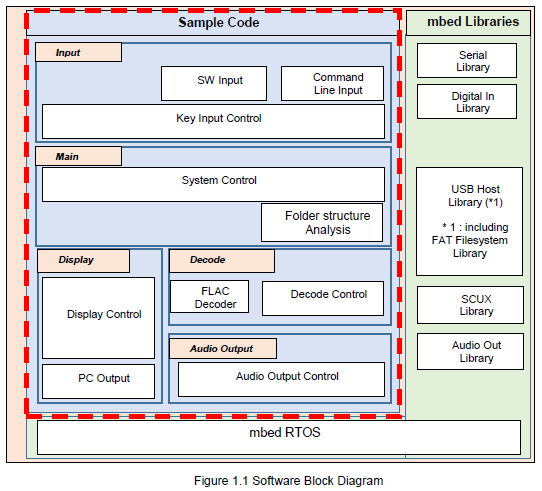
1.2 Pin Definitions
Table 1.1 shows the pins that this sample code are to use.
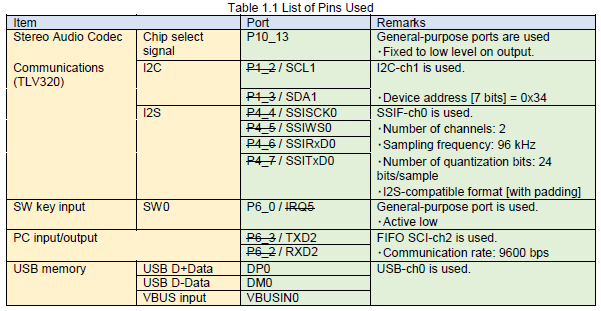
2. Sample Code Operating Environment
This sample code runs in GR-PEACH + the Audio/Camera shield for the GR-PEACH environment. This section explains the functions of the ports that are used by this sample code.
2.1 Operating Environment
Figure 2.1 shows the configuration of the operating environment for running this sample code.
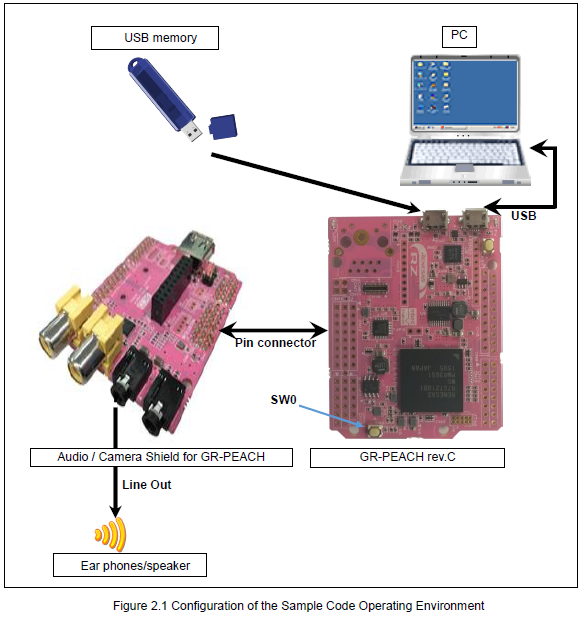
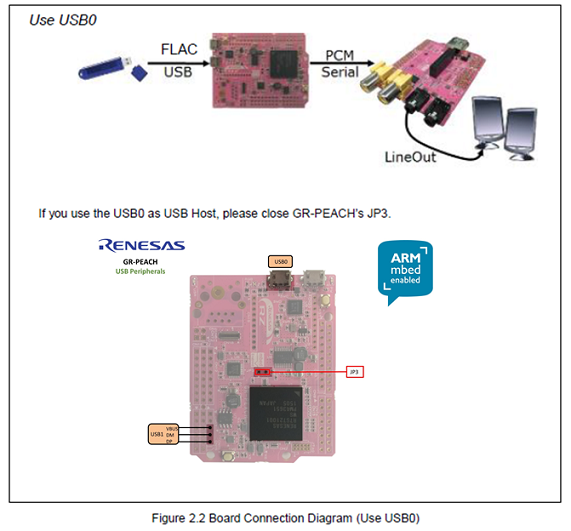
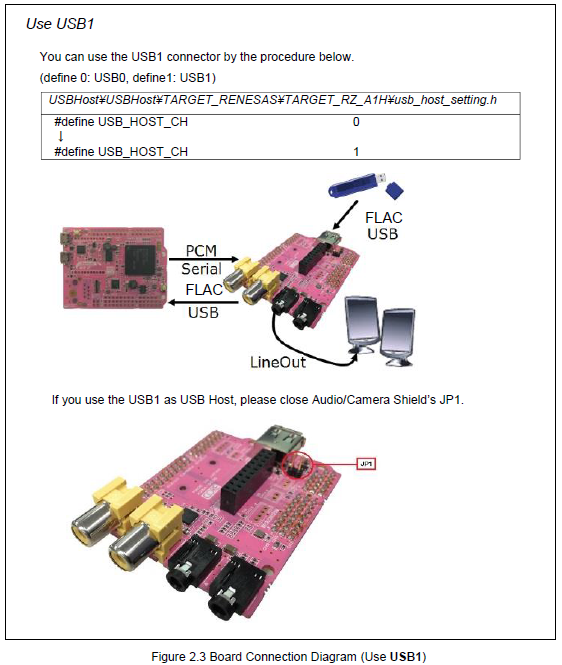
2.2 List of User Operations
A list of user operations on the command line, TFT touch keys, and switch key that the user can perform for this sample code is shown in. Table 2.1.

3. Function Outline
The functions of this sample code are summarized in Table 3.1 to Table 3.3.
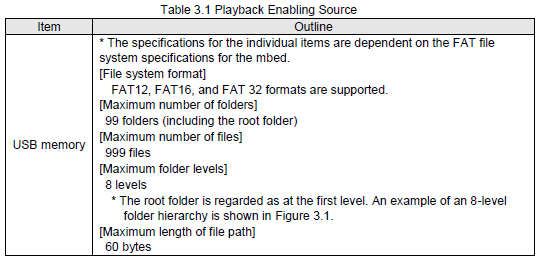
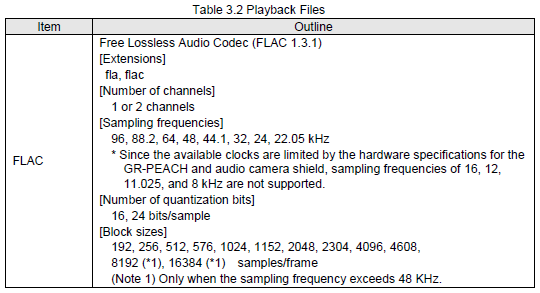
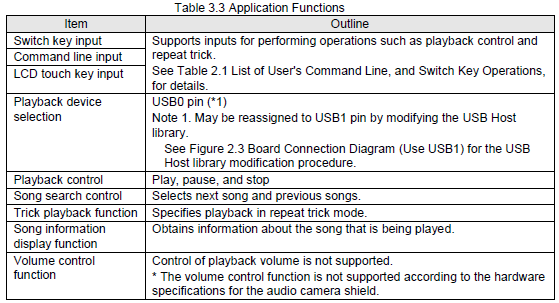
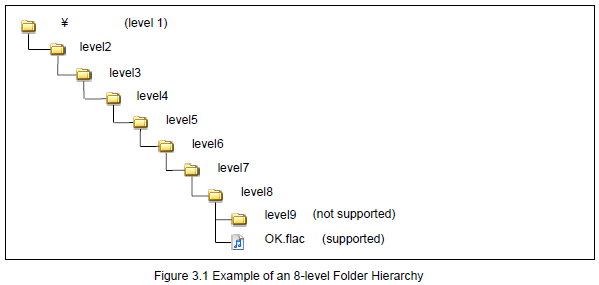
3.1 Playback Control
The playback control that the sample code supports include play, pause, stop, skip to next, and skip to previous.
3.2 Trick Play Control
Manipulating "Repeat" alternates between "Repeat mode On" and "Repeat mode Off". The default mode is "Repeat mode On". When the repeat mode is on, the playback of the first song starts after the playback of the last song is finished. When the repeat mode is off, the sample code enters the stopped state after the playback of the last song is finished.
3.3 Acquisition of the Song Information
The information of the song being played is obtained by operating the "Play info" during the playback of the song. Table 3.4 lists the items of information that can be obtained by the "Play info" operation.

3.4 How the Folder Structure is Analyzed
The sample coded analyzes the folder structure in the breadth-first search order. The order in which files are numbered is illustrated in Table 3.5. The sample code does not sort the files by file or folder name.
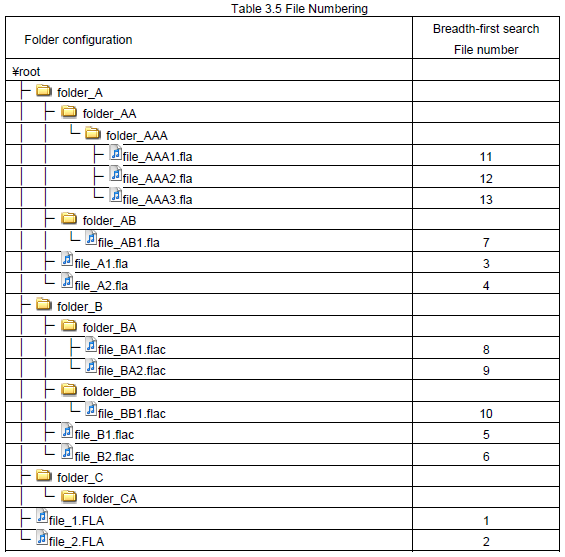
4.Others
The default setting of serial communication (baud rate etc.) in mbed is shown the following link.
Please refer to the link and change the settings of your PC terminal software.
The default value of baud rate in mbed is 9600, and this application uses baud rate 9600.
https://developer.mbed.org/teams/Renesas/wiki/GR-PEACH-Getting-Started#install-the-usb-serial-communication
Diff: flac/src/libFLAC/cpu.c
- Revision:
- 0:ee40da884cfc
--- /dev/null Thu Jan 01 00:00:00 1970 +0000
+++ b/flac/src/libFLAC/cpu.c Fri Oct 16 04:28:07 2015 +0000
@@ -0,0 +1,487 @@
+/* libFLAC - Free Lossless Audio Codec library
+ * Copyright (C) 2001-2009 Josh Coalson
+ * Copyright (C) 2011-2014 Xiph.Org Foundation
+ *
+ * Redistribution and use in source and binary forms, with or without
+ * modification, are permitted provided that the following conditions
+ * are met:
+ *
+ * - Redistributions of source code must retain the above copyright
+ * notice, this list of conditions and the following disclaimer.
+ *
+ * - Redistributions in binary form must reproduce the above copyright
+ * notice, this list of conditions and the following disclaimer in the
+ * documentation and/or other materials provided with the distribution.
+ *
+ * - Neither the name of the Xiph.org Foundation nor the names of its
+ * contributors may be used to endorse or promote products derived from
+ * this software without specific prior written permission.
+ *
+ * THIS SOFTWARE IS PROVIDED BY THE COPYRIGHT HOLDERS AND CONTRIBUTORS
+ * ``AS IS'' AND ANY EXPRESS OR IMPLIED WARRANTIES, INCLUDING, BUT NOT
+ * LIMITED TO, THE IMPLIED WARRANTIES OF MERCHANTABILITY AND FITNESS FOR
+ * A PARTICULAR PURPOSE ARE DISCLAIMED. IN NO EVENT SHALL THE FOUNDATION OR
+ * CONTRIBUTORS BE LIABLE FOR ANY DIRECT, INDIRECT, INCIDENTAL, SPECIAL,
+ * EXEMPLARY, OR CONSEQUENTIAL DAMAGES (INCLUDING, BUT NOT LIMITED TO,
+ * PROCUREMENT OF SUBSTITUTE GOODS OR SERVICES; LOSS OF USE, DATA, OR
+ * PROFITS; OR BUSINESS INTERRUPTION) HOWEVER CAUSED AND ON ANY THEORY OF
+ * LIABILITY, WHETHER IN CONTRACT, STRICT LIABILITY, OR TORT (INCLUDING
+ * NEGLIGENCE OR OTHERWISE) ARISING IN ANY WAY OUT OF THE USE OF THIS
+ * SOFTWARE, EVEN IF ADVISED OF THE POSSIBILITY OF SUCH DAMAGE.
+ */
+
+#ifdef HAVE_CONFIG_H
+# include <config.h>
+#endif
+
+#include "private/cpu.h"
+#include <stdlib.h>
+#include <memory.h>
+#ifdef DEBUG
+# include <stdio.h>
+#endif
+
+#if defined FLAC__CPU_IA32
+# include <signal.h>
+
+static void disable_sse(FLAC__CPUInfo *info)
+{
+ info->ia32.sse = false;
+ info->ia32.sse2 = false;
+ info->ia32.sse3 = false;
+ info->ia32.ssse3 = false;
+ info->ia32.sse41 = false;
+ info->ia32.sse42 = false;
+}
+
+static void disable_avx(FLAC__CPUInfo *info)
+{
+ info->ia32.avx = false;
+ info->ia32.avx2 = false;
+ info->ia32.fma = false;
+}
+
+#elif defined FLAC__CPU_X86_64
+
+static void disable_avx(FLAC__CPUInfo *info)
+{
+ info->x86.avx = false;
+ info->x86.avx2 = false;
+ info->x86.fma = false;
+}
+#endif
+
+#if defined (__NetBSD__) || defined(__OpenBSD__)
+#include <sys/param.h>
+#include <sys/sysctl.h>
+#include <machine/cpu.h>
+#endif
+
+#if defined(__FreeBSD__) || defined(__FreeBSD_kernel__) || defined(__DragonFly__)
+#include <sys/types.h>
+#include <sys/sysctl.h>
+#endif
+
+#if defined(__APPLE__)
+/* how to get sysctlbyname()? */
+#endif
+
+#ifdef FLAC__CPU_IA32
+/* these are flags in EDX of CPUID AX=00000001 */
+static const unsigned FLAC__CPUINFO_IA32_CPUID_CMOV = 0x00008000;
+static const unsigned FLAC__CPUINFO_IA32_CPUID_MMX = 0x00800000;
+static const unsigned FLAC__CPUINFO_IA32_CPUID_FXSR = 0x01000000;
+static const unsigned FLAC__CPUINFO_IA32_CPUID_SSE = 0x02000000;
+static const unsigned FLAC__CPUINFO_IA32_CPUID_SSE2 = 0x04000000;
+#endif
+
+/* these are flags in ECX of CPUID AX=00000001 */
+static const unsigned FLAC__CPUINFO_IA32_CPUID_SSE3 = 0x00000001;
+static const unsigned FLAC__CPUINFO_IA32_CPUID_SSSE3 = 0x00000200;
+static const unsigned FLAC__CPUINFO_IA32_CPUID_SSE41 = 0x00080000;
+static const unsigned FLAC__CPUINFO_IA32_CPUID_SSE42 = 0x00100000;
+
+#if defined FLAC__AVX_SUPPORTED
+/* these are flags in ECX of CPUID AX=00000001 */
+static const unsigned FLAC__CPUINFO_IA32_CPUID_OSXSAVE = 0x08000000;
+static const unsigned FLAC__CPUINFO_IA32_CPUID_AVX = 0x10000000;
+static const unsigned FLAC__CPUINFO_IA32_CPUID_FMA = 0x00001000;
+/* these are flags in EBX of CPUID AX=00000007 */
+static const unsigned FLAC__CPUINFO_IA32_CPUID_AVX2 = 0x00000020;
+#endif
+
+/*
+ * Extra stuff needed for detection of OS support for SSE on IA-32
+ */
+#if defined(FLAC__CPU_IA32) && !defined FLAC__NO_ASM && (defined FLAC__HAS_NASM || defined FLAC__HAS_X86INTRIN) && !defined FLAC__NO_SSE_OS && !defined FLAC__SSE_OS
+# if defined(__linux__)
+/*
+ * If the OS doesn't support SSE, we will get here with a SIGILL. We
+ * modify the return address to jump over the offending SSE instruction
+ * and also the operation following it that indicates the instruction
+ * executed successfully. In this way we use no global variables and
+ * stay thread-safe.
+ *
+ * 3 + 3 + 6:
+ * 3 bytes for "xorps xmm0,xmm0"
+ * 3 bytes for estimate of how long the follwing "inc var" instruction is
+ * 6 bytes extra in case our estimate is wrong
+ * 12 bytes puts us in the NOP "landing zone"
+ */
+# include <sys/ucontext.h>
+ static void sigill_handler_sse_os(int signal, siginfo_t *si, void *uc)
+ {
+ (void)signal, (void)si;
+ ((ucontext_t*)uc)->uc_mcontext.gregs[14/*REG_EIP*/] += 3 + 3 + 6;
+ }
+# elif defined(_MSC_VER)
+# include <windows.h>
+# endif
+#endif
+
+
+void FLAC__cpu_info(FLAC__CPUInfo *info)
+{
+/*
+ * IA32-specific
+ */
+#ifdef FLAC__CPU_IA32
+ FLAC__bool ia32_fxsr = false;
+ FLAC__bool ia32_osxsave = false;
+ (void) ia32_fxsr; (void) ia32_osxsave; /* to avoid warnings about unused variables */
+ memset(info, 0, sizeof(*info));
+ info->type = FLAC__CPUINFO_TYPE_IA32;
+#if !defined FLAC__NO_ASM && (defined FLAC__HAS_NASM || defined FLAC__HAS_X86INTRIN)
+ info->use_asm = true; /* we assume a minimum of 80386 with FLAC__CPU_IA32 */
+#ifdef FLAC__HAS_X86INTRIN
+ if(!FLAC__cpu_have_cpuid_x86())
+ return;
+#else
+ if(!FLAC__cpu_have_cpuid_asm_ia32())
+ return;
+#endif
+ {
+ /* http://www.sandpile.org/x86/cpuid.htm */
+#ifdef FLAC__HAS_X86INTRIN
+ FLAC__uint32 flags_eax, flags_ebx, flags_ecx, flags_edx;
+ FLAC__cpu_info_x86(1, &flags_eax, &flags_ebx, &flags_ecx, &flags_edx);
+#else
+ FLAC__uint32 flags_ecx, flags_edx;
+ FLAC__cpu_info_asm_ia32(&flags_edx, &flags_ecx);
+#endif
+ info->ia32.cmov = (flags_edx & FLAC__CPUINFO_IA32_CPUID_CMOV )? true : false;
+ info->ia32.mmx = (flags_edx & FLAC__CPUINFO_IA32_CPUID_MMX )? true : false;
+ ia32_fxsr = (flags_edx & FLAC__CPUINFO_IA32_CPUID_FXSR )? true : false;
+ info->ia32.sse = (flags_edx & FLAC__CPUINFO_IA32_CPUID_SSE )? true : false;
+ info->ia32.sse2 = (flags_edx & FLAC__CPUINFO_IA32_CPUID_SSE2 )? true : false;
+ info->ia32.sse3 = (flags_ecx & FLAC__CPUINFO_IA32_CPUID_SSE3 )? true : false;
+ info->ia32.ssse3 = (flags_ecx & FLAC__CPUINFO_IA32_CPUID_SSSE3)? true : false;
+ info->ia32.sse41 = (flags_ecx & FLAC__CPUINFO_IA32_CPUID_SSE41)? true : false;
+ info->ia32.sse42 = (flags_ecx & FLAC__CPUINFO_IA32_CPUID_SSE42)? true : false;
+#if defined FLAC__HAS_X86INTRIN && defined FLAC__AVX_SUPPORTED
+ ia32_osxsave = (flags_ecx & FLAC__CPUINFO_IA32_CPUID_OSXSAVE)? true : false;
+ info->ia32.avx = (flags_ecx & FLAC__CPUINFO_IA32_CPUID_AVX )? true : false;
+ info->ia32.fma = (flags_ecx & FLAC__CPUINFO_IA32_CPUID_FMA )? true : false;
+ FLAC__cpu_info_x86(7, &flags_eax, &flags_ebx, &flags_ecx, &flags_edx);
+ info->ia32.avx2 = (flags_ebx & FLAC__CPUINFO_IA32_CPUID_AVX2 )? true : false;
+#endif
+ }
+
+#ifdef DEBUG
+ fprintf(stderr, "CPU info (IA-32):\n");
+ fprintf(stderr, " CMOV ....... %c\n", info->ia32.cmov ? 'Y' : 'n');
+ fprintf(stderr, " MMX ........ %c\n", info->ia32.mmx ? 'Y' : 'n');
+ fprintf(stderr, " SSE ........ %c\n", info->ia32.sse ? 'Y' : 'n');
+ fprintf(stderr, " SSE2 ....... %c\n", info->ia32.sse2 ? 'Y' : 'n');
+ fprintf(stderr, " SSE3 ....... %c\n", info->ia32.sse3 ? 'Y' : 'n');
+ fprintf(stderr, " SSSE3 ...... %c\n", info->ia32.ssse3 ? 'Y' : 'n');
+ fprintf(stderr, " SSE41 ...... %c\n", info->ia32.sse41 ? 'Y' : 'n');
+ fprintf(stderr, " SSE42 ...... %c\n", info->ia32.sse42 ? 'Y' : 'n');
+# if defined FLAC__HAS_X86INTRIN && defined FLAC__AVX_SUPPORTED
+ fprintf(stderr, " AVX ........ %c\n", info->ia32.avx ? 'Y' : 'n');
+ fprintf(stderr, " FMA ........ %c\n", info->ia32.fma ? 'Y' : 'n');
+ fprintf(stderr, " AVX2 ....... %c\n", info->ia32.avx2 ? 'Y' : 'n');
+# endif
+#endif
+
+ /*
+ * now have to check for OS support of SSE instructions
+ */
+ if(info->ia32.sse) {
+#if defined FLAC__NO_SSE_OS
+ /* assume user knows better than us; turn it off */
+ disable_sse(info);
+#elif defined FLAC__SSE_OS
+ /* assume user knows better than us; leave as detected above */
+#elif defined(__FreeBSD__) || defined(__FreeBSD_kernel__) || defined(__DragonFly__) || defined(__APPLE__)
+ int sse = 0;
+ size_t len;
+ /* at least one of these must work: */
+ len = sizeof(sse); sse = sse || (sysctlbyname("hw.instruction_sse", &sse, &len, NULL, 0) == 0 && sse);
+ len = sizeof(sse); sse = sse || (sysctlbyname("hw.optional.sse" , &sse, &len, NULL, 0) == 0 && sse); /* __APPLE__ ? */
+ if(!sse)
+ disable_sse(info);
+#elif defined(__NetBSD__) || defined (__OpenBSD__)
+# if __NetBSD_Version__ >= 105250000 || (defined __OpenBSD__)
+ int val = 0, mib[2] = { CTL_MACHDEP, CPU_SSE };
+ size_t len = sizeof(val);
+ if(sysctl(mib, 2, &val, &len, NULL, 0) < 0 || !val)
+ disable_sse(info);
+ else { /* double-check SSE2 */
+ mib[1] = CPU_SSE2;
+ len = sizeof(val);
+ if(sysctl(mib, 2, &val, &len, NULL, 0) < 0 || !val) {
+ disable_sse(info);
+ info->ia32.sse = true;
+ }
+ }
+# else
+ disable_sse(info);
+# endif
+#elif defined(__linux__)
+ int sse = 0;
+ struct sigaction sigill_save;
+ struct sigaction sigill_sse;
+ sigill_sse.sa_sigaction = sigill_handler_sse_os;
+ __sigemptyset(&sigill_sse.sa_mask);
+ sigill_sse.sa_flags = SA_SIGINFO | SA_RESETHAND; /* SA_RESETHAND just in case our SIGILL return jump breaks, so we don't get stuck in a loop */
+ if(0 == sigaction(SIGILL, &sigill_sse, &sigill_save))
+ {
+ /* http://www.ibiblio.org/gferg/ldp/GCC-Inline-Assembly-HOWTO.html */
+ /* see sigill_handler_sse_os() for an explanation of the following: */
+ asm volatile (
+ "xorps %%xmm0,%%xmm0\n\t" /* will cause SIGILL if unsupported by OS */
+ "incl %0\n\t" /* SIGILL handler will jump over this */
+ /* landing zone */
+ "nop\n\t" /* SIGILL jump lands here if "inc" is 9 bytes */
+ "nop\n\t"
+ "nop\n\t"
+ "nop\n\t"
+ "nop\n\t"
+ "nop\n\t"
+ "nop\n\t" /* SIGILL jump lands here if "inc" is 3 bytes (expected) */
+ "nop\n\t"
+ "nop" /* SIGILL jump lands here if "inc" is 1 byte */
+ : "=r"(sse)
+ : "0"(sse)
+ );
+
+ sigaction(SIGILL, &sigill_save, NULL);
+ }
+
+ if(!sse)
+ disable_sse(info);
+#elif defined(_MSC_VER)
+ __try {
+ __asm {
+ xorps xmm0,xmm0
+ }
+ }
+ __except(EXCEPTION_EXECUTE_HANDLER) {
+ if (_exception_code() == STATUS_ILLEGAL_INSTRUCTION)
+ disable_sse(info);
+ }
+#elif defined(__GNUC__) /* MinGW goes here */
+ int sse = 0;
+ /* Based on the idea described in Agner Fog's manual "Optimizing subroutines in assembly language" */
+ /* In theory, not guaranteed to detect lack of OS SSE support on some future Intel CPUs, but in practice works (see the aforementioned manual) */
+ if (ia32_fxsr) {
+ struct {
+ FLAC__uint32 buff[128];
+ } __attribute__((aligned(16))) fxsr;
+ FLAC__uint32 old_val, new_val;
+
+ asm volatile ("fxsave %0" : "=m" (fxsr) : "m" (fxsr));
+ old_val = fxsr.buff[50];
+ fxsr.buff[50] ^= 0x0013c0de; /* change value in the buffer */
+ asm volatile ("fxrstor %0" : "=m" (fxsr) : "m" (fxsr)); /* try to change SSE register */
+ fxsr.buff[50] = old_val; /* restore old value in the buffer */
+ asm volatile ("fxsave %0 " : "=m" (fxsr) : "m" (fxsr)); /* old value will be overwritten if SSE register was changed */
+ new_val = fxsr.buff[50]; /* == old_val if FXRSTOR didn't change SSE register and (old_val ^ 0x0013c0de) otherwise */
+ fxsr.buff[50] = old_val; /* again restore old value in the buffer */
+ asm volatile ("fxrstor %0" : "=m" (fxsr) : "m" (fxsr)); /* restore old values of registers */
+
+ if ((old_val^new_val) == 0x0013c0de)
+ sse = 1;
+ }
+ if(!sse)
+ disable_sse(info);
+#else
+ /* no way to test, disable to be safe */
+ disable_sse(info);
+#endif
+#ifdef DEBUG
+ fprintf(stderr, " SSE OS sup . %c\n", info->ia32.sse ? 'Y' : 'n');
+#endif
+ }
+ else /* info->ia32.sse == false */
+ disable_sse(info);
+
+ /*
+ * now have to check for OS support of AVX instructions
+ */
+ if(info->ia32.avx && ia32_osxsave) {
+ FLAC__uint32 ecr = FLAC__cpu_xgetbv_x86();
+ if ((ecr & 0x6) != 0x6)
+ disable_avx(info);
+#ifdef DEBUG
+ fprintf(stderr, " AVX OS sup . %c\n", info->ia32.avx ? 'Y' : 'n');
+#endif
+ }
+ else /* no OS AVX support*/
+ disable_avx(info);
+#else
+ info->use_asm = false;
+#endif
+
+/*
+ * x86-64-specific
+ */
+#elif defined FLAC__CPU_X86_64
+ FLAC__bool x86_osxsave = false;
+ (void) x86_osxsave; /* to avoid warnings about unused variables */
+ memset(info, 0, sizeof(*info));
+ info->type = FLAC__CPUINFO_TYPE_X86_64;
+#if !defined FLAC__NO_ASM && defined FLAC__HAS_X86INTRIN
+ info->use_asm = true;
+ {
+ /* http://www.sandpile.org/x86/cpuid.htm */
+ FLAC__uint32 flags_eax, flags_ebx, flags_ecx, flags_edx;
+ FLAC__cpu_info_x86(1, &flags_eax, &flags_ebx, &flags_ecx, &flags_edx);
+ info->x86.sse3 = (flags_ecx & FLAC__CPUINFO_IA32_CPUID_SSE3 )? true : false;
+ info->x86.ssse3 = (flags_ecx & FLAC__CPUINFO_IA32_CPUID_SSSE3)? true : false;
+ info->x86.sse41 = (flags_ecx & FLAC__CPUINFO_IA32_CPUID_SSE41)? true : false;
+ info->x86.sse42 = (flags_ecx & FLAC__CPUINFO_IA32_CPUID_SSE42)? true : false;
+#if defined FLAC__AVX_SUPPORTED
+ x86_osxsave = (flags_ecx & FLAC__CPUINFO_IA32_CPUID_OSXSAVE)? true : false;
+ info->x86.avx = (flags_ecx & FLAC__CPUINFO_IA32_CPUID_AVX )? true : false;
+ info->x86.fma = (flags_ecx & FLAC__CPUINFO_IA32_CPUID_FMA )? true : false;
+ FLAC__cpu_info_x86(7, &flags_eax, &flags_ebx, &flags_ecx, &flags_edx);
+ info->x86.avx2 = (flags_ebx & FLAC__CPUINFO_IA32_CPUID_AVX2 )? true : false;
+#endif
+ }
+#ifdef DEBUG
+ fprintf(stderr, "CPU info (x86-64):\n");
+ fprintf(stderr, " SSE3 ....... %c\n", info->x86.sse3 ? 'Y' : 'n');
+ fprintf(stderr, " SSSE3 ...... %c\n", info->x86.ssse3 ? 'Y' : 'n');
+ fprintf(stderr, " SSE41 ...... %c\n", info->x86.sse41 ? 'Y' : 'n');
+ fprintf(stderr, " SSE42 ...... %c\n", info->x86.sse42 ? 'Y' : 'n');
+# if defined FLAC__AVX_SUPPORTED
+ fprintf(stderr, " AVX ........ %c\n", info->x86.avx ? 'Y' : 'n');
+ fprintf(stderr, " FMA ........ %c\n", info->x86.fma ? 'Y' : 'n');
+ fprintf(stderr, " AVX2 ....... %c\n", info->x86.avx2 ? 'Y' : 'n');
+# endif
+#endif
+
+ /*
+ * now have to check for OS support of AVX instructions
+ */
+ if(info->x86.avx && x86_osxsave) {
+ FLAC__uint32 ecr = FLAC__cpu_xgetbv_x86();
+ if ((ecr & 0x6) != 0x6)
+ disable_avx(info);
+#ifdef DEBUG
+ fprintf(stderr, " AVX OS sup . %c\n", info->x86.avx ? 'Y' : 'n');
+#endif
+ }
+ else /* no OS AVX support*/
+ disable_avx(info);
+#else
+ info->use_asm = false;
+#endif
+
+/*
+ * unknown CPU
+ */
+#else
+ info->type = FLAC__CPUINFO_TYPE_UNKNOWN;
+ info->use_asm = false;
+#endif
+}
+
+#if (defined FLAC__CPU_IA32 || defined FLAC__CPU_X86_64) && defined FLAC__HAS_X86INTRIN
+
+#if defined _MSC_VER
+#include <intrin.h> /* for __cpuid() and _xgetbv() */
+#elif defined __GNUC__ && defined HAVE_CPUID_H
+#include <cpuid.h> /* for __get_cpuid() and __get_cpuid_max() */
+#endif
+
+FLAC__uint32 FLAC__cpu_have_cpuid_x86(void)
+{
+#ifdef FLAC__CPU_X86_64
+ return 1;
+#else
+# if defined _MSC_VER || defined __INTEL_COMPILER /* Do they support CPUs w/o CPUID support (or OSes that work on those CPUs)? */
+ FLAC__uint32 flags1, flags2;
+ __asm {
+ pushfd
+ pushfd
+ pop eax
+ mov flags1, eax
+ xor eax, 0x200000
+ push eax
+ popfd
+ pushfd
+ pop eax
+ mov flags2, eax
+ popfd
+ }
+ if (((flags1^flags2) & 0x200000) != 0)
+ return 1;
+ else
+ return 0;
+# elif defined __GNUC__ && defined HAVE_CPUID_H
+ if (__get_cpuid_max(0, 0) != 0)
+ return 1;
+ else
+ return 0;
+# else
+ return 0;
+# endif
+#endif
+}
+
+void FLAC__cpu_info_x86(FLAC__uint32 level, FLAC__uint32 *eax, FLAC__uint32 *ebx, FLAC__uint32 *ecx, FLAC__uint32 *edx)
+{
+#if defined _MSC_VER || defined __INTEL_COMPILER
+ int cpuinfo[4];
+ int ext = level & 0x80000000;
+ __cpuid(cpuinfo, ext);
+ if((unsigned)cpuinfo[0] < level) {
+ *eax = *ebx = *ecx = *edx = 0;
+ return;
+ }
+#if defined FLAC__AVX_SUPPORTED
+ __cpuidex(cpuinfo, level, 0); /* for AVX2 detection */
+#else
+ __cpuid(cpuinfo, level); /* some old compilers don't support __cpuidex */
+#endif
+ *eax = cpuinfo[0]; *ebx = cpuinfo[1]; *ecx = cpuinfo[2]; *edx = cpuinfo[3];
+#elif defined __GNUC__ && defined HAVE_CPUID_H
+ FLAC__uint32 ext = level & 0x80000000;
+ __cpuid(ext, *eax, *ebx, *ecx, *edx);
+ if (*eax < level) {
+ *eax = *ebx = *ecx = *edx = 0;
+ return;
+ }
+ __cpuid_count(level, 0, *eax, *ebx, *ecx, *edx);
+#else
+ *eax = *ebx = *ecx = *edx = 0;
+#endif
+}
+
+FLAC__uint32 FLAC__cpu_xgetbv_x86(void)
+{
+#if (defined _MSC_VER || defined __INTEL_COMPILER) && defined FLAC__AVX_SUPPORTED
+ return (FLAC__uint32)_xgetbv(0);
+#elif defined __GNUC__
+ FLAC__uint32 lo, hi;
+ asm volatile (".byte 0x0f, 0x01, 0xd0" : "=a"(lo), "=d"(hi) : "c" (0));
+ return lo;
+#else
+ return 0;
+#endif
+}
+
+#endif /* (FLAC__CPU_IA32 || FLAC__CPU_X86_64) && FLAC__HAS_X86INTRIN */